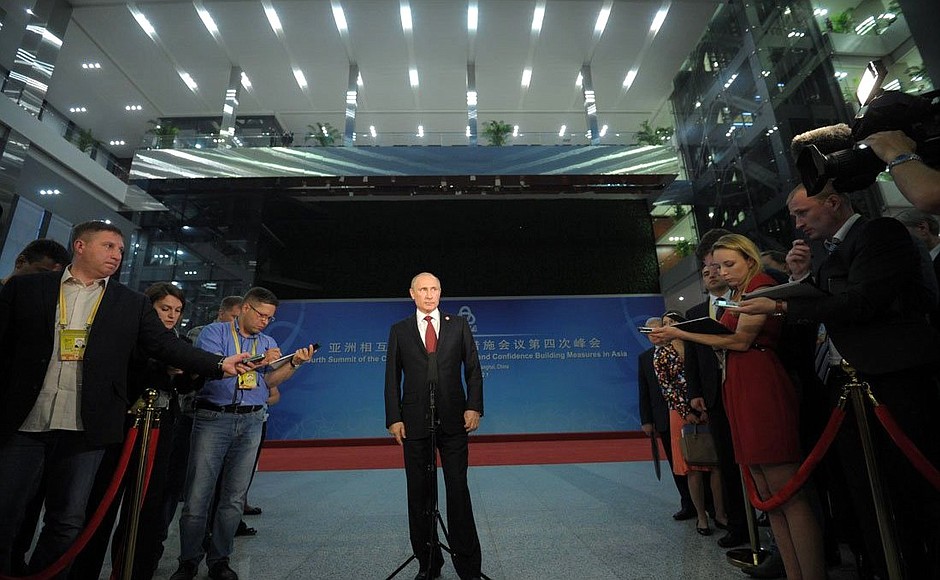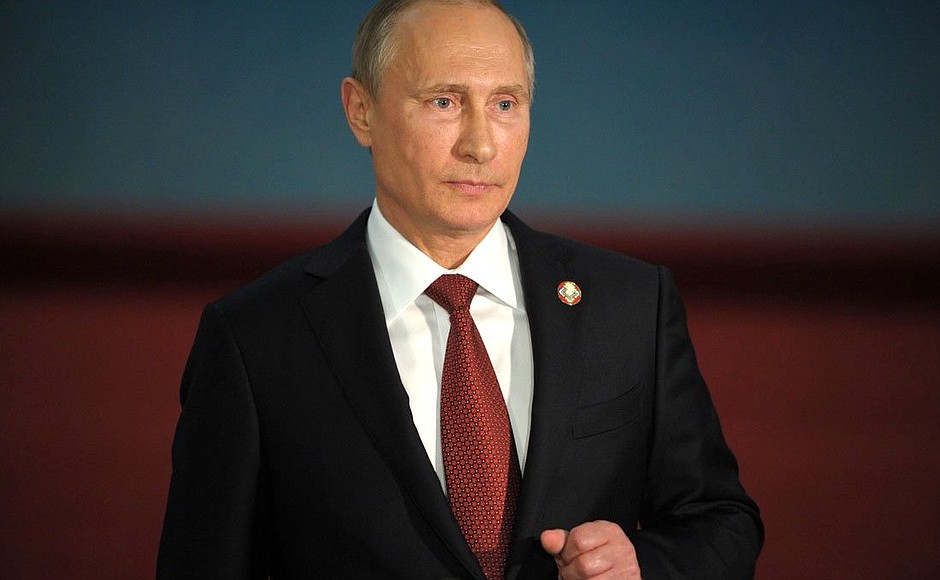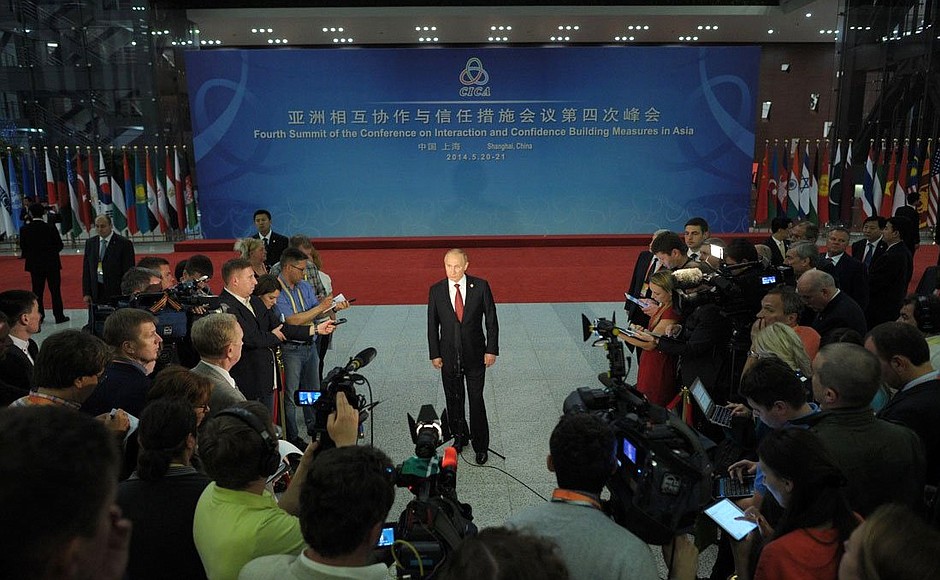Question: Mr President, what are the gas contract’s main points and what was the stumbling block that made the talks take so long? What was the final price agreed on?
President of Russia Vladimir Putin: Let me say a few words first about Russia and China’s bilateral relations.
There are plenty of visits, but yesterday’s visit and its practical continuation today were very big events in bilateral relations between the People’s Republic of China and the Russian Federation, and produced many concrete agreements that reflect our increased political cooperation too. I am referring here to the signing of the political memorandum and the establishment of new mechanisms for cooperation between our two countries and coordinating our positions, and also to our economic cooperation, which focuses above all on particular regions of the Russian Federation.
In this particular case we are looking above all at Central Russia, Russia’s western regions, and at economic cooperation that concerns a broad range of production sectors. Here, the newly signed agreements – 51 in total – represent a value of tens of billions of dollars, and as I said, this concerns different production sectors.
As for the contract you asked about, yes, this is indeed a historic event for Russia’s gas sector. It is historic even looking back to the Soviet era too. This is the biggest contract in terms of sale by volume to any one country in the sector’s entire history, whether the Soviet period or modern Russia.
Reaching this stage really did require some very complicated work at the expert level. Our Chinese friends drive a hard bargain as negotiators. As you know, the work went on yesterday until half past three in the morning, and today, almost right from the morning, they were back at centre field once more.
But through mutual compromises we managed to settle on contract terms that are not just acceptable conditions but actually satisfy both sides. In the end, both sides were happy with the compromises made on the price and other conditions.
The relevant decisions still need to be adopted at government level in both the People’s Republic of China and the Russian Federation, but the deal has been done now.
See also
I also note that this project’s implementation will see us create what will be with no exaggeration one of the biggest construction sites in the world over the next four years. On the Russian side alone, we will need to carry out work at new fields on our territory, and these are very big fields – the gas fields of Kovykta and Chayanda. Total proven recoverable resources at these fields come to three trillion cubic metres of gas, and in actual fact the resources there are even higher.
They ensure us guaranteed supplies for 50 or so years, and I want to stress that this includes supplies for the domestic market. Russia alone will invest a total of around $55 billion in this project. It is hard to give an exact figure, but I think we will see at least $20 billion in investment from China too.
This is not just about developing gas production but also about the gas-chemical industry, a helium plant, new companies, new infrastructure, thousands of new jobs – and this is not exaggerating – thousands of modern, high-tech new jobs, and infrastructure development at the production sites and along the transport routes.
This infrastructure will be used not only by the gas industry and gas transporters, but also by the local authorities for other economic sectors in the regions concerned. Therefore, this is a big event in the gas sector, not just in Russia but it would be no exaggeration to say it is a major event for the entire global energy sector and certainly for Asia.
We should note too that, first, now that the contract has been signed, work will begin immediately, and second, this gives us the chance to start work on our next project with our Chinese partners, namely, planning a western supply route from the resource base in Western Siberia.
Finally, and also very importantly, this gives us the chance to carry out our plans to develop Russia’s gas sector by linking the eastern and western production regions and connecting them with the necessary infrastructure, thus making it possible if need be to diversify supplies from west to east and east to west.
Question: And the price?
Vladimir Putin: The price satisfies both sides. It is pegged to the gas price and gas fuel price, as is the case with all of our international contracts with our Western partners, our partners in Western Europe. This is a balanced general formula for calculating the price. The final price will be calculated using this formula, and this satisfies Gazprom and our Chinese partners.
Question: Mr President, Ukraine is the thorniest issue in global politics at the moment. You instructed the Defence Ministry to withdraw Russian forces from the Ukrainian border and have them return to their garrisons. But the West (the Pentagon and NATO) do not yet see evidence of this withdrawal. Could you explain the situation and say what is actually happening?
Vladimir Putin: Our forces were not on the border anyway. They were indeed quite close to the border, as you probably heard. Some time ago, I gave the Defence Ministry the order to withdraw them to the training sites, the test grounds. These sites are also in neighbouring regions, in Rostov Region, quite near to the border. But now the Defence Ministry has received a new order to withdraw them from these test grounds too.
Let me stress once more that we are doing this not because we do not dare to keep our forces in those regions – after all, we are a sovereign state and can station our forces where we wish. We are doing this as an additional step to help create a favourable environment for the upcoming presidential election in Ukraine. We made this decision so as to put an end to speculations on this subject.
If someone cannot see what is happening there, perhaps they should take a closer look. The fact of the matter is that there is quite a large number of forces there, quite a lot of hardware. Just withdrawing them all requires some serious preparation in itself, including organising their transportation. But I think that with the good weather, they will soon be able to see all of this from space.
Question: Mr President, let me come back to the presidential election in Ukraine. Do you think the election will go ahead and who do you think might win?
Let me ask another second question, if I may. Two of my colleagues, a cameraman and a reporter for LifeNews were detained in Ukraine. They are accused of terrorism. They are journalists but are being accused of terrorism, interrogated, handcuffed, have sacks put over their heads. Can anything be done here?
Vladimir Putin: On the first issue, you have no doubt heard my position already. My view is that what is important is not the election itself but to organise relations with all of Ukraine’s regions so that people, whether in the west, south, east or north of the country all feel that they are full-fledged citizens, and so that ethnic minorities have full rights as citizens, including the right to use their native language.
In this context, in my view, given that the Ukrainian constitution still legally in force at this moment does not make it possible to hold an election when the country has a president, President Yanukovych, still legally in office – and I stress that in legal terms he is still the president in office – it would seem easier in this situation to first hold a referendum on all the basic issues, hold a referendum on the constitution and adopt it, and then on the basis of the new constitution elect a president and a parliament and form a government.
I think this would be a lot more logical and would bring greater stability. But, with the support of European countries and the United States, the Ukrainian authorities have made a different decision. In any case the political processes underway, including on legitimising the current authorities, are a positive step of course.
At the same time, it will be very difficult for us to build relations with those who come to power with punitive operations still underway in southeast Ukraine, and who obstruct the media’s work. What’s more, they are not just obstructing the press but are behaving more and more aggressively.
In terms of legitimacy and objectivity of the results, this will raise big questions for us of course. I hope very much that our partners in Europe and the United States will finally hear and understand what is going on.
What is happening now with journalists is unacceptable. The journalists from LifeNews are being accused of all manner of heinous crimes, including that they were carrying weapons, but this is utter nonsense and complete rubbish. Foreign citizens working for Russian media outlets are also being detained. This is completely unacceptable. Of course, there will be big questions right from the start on the legitimacy of all of these political procedures.
I hope the Ukrainian authorities will take the necessary steps to at least humanise the political process unfolding in Ukraine now. But let me say once again that any political process is nonetheless better than armed confrontation.
Our position at the moment is to establish direct contacts with the current authorities in Kiev and in southeast Ukraine. You know that we have done everything we can to establish these direct contacts.
Incidentally, my order to the Defence Ministry to withdraw the troops from the areas where they had been carrying out training exercises was also partly related to the fact that these first contacts had begun. I hope that they will continue positively.
I see Mr Peskov [Presidential Press Secretary] is prompting me there that the price formula is that same one as that used in our other contracts and is pegged to the market price for oil and petroleum products. Pardon me if I made a mistake.
Question: Mr President, can you clarify on the price? How does it compare to the European price?
Vladimir Putin: Let me say again that it is pegged in the same way as the formula used for calculating the price for European consumers. It is the same formula pegged to the market price for a basket of oil and petroleum products.
Question: I have a question on security. One of the security threats for the whole region, including Russia, is terrorism. Ukrainian radicals have declared on repeated occasions their readiness to carry out terrorist attacks on Russian soil. Is there any information on preparation of such attacks? Could the recent train crash in the Moscow Region perhaps be the result of a terrorist attack?
Vladimir Putin: At present we have no reason to believe that the rail accident in the Moscow Region was the result of a terrorist attack. The causes of this accident must first be thoroughly investigated and only then can we draw some conclusions. At the moment we have no such information.
We are following very closely the movements of some of the radical groups in Ukraine. Some individuals have already been detained in Russia. The FSB [Federal Security Service] is following quite closely their movements in Ukraine itself and across the Russian-Ukrainian border. As I said, some people have already been detained, and this was reported in the media too.
But we must of course give an objective assessment of what is happening in this area. I think that the nightmare and horror that we saw on our TV screens, the events we know well that took place in Odessa, have not yet received an adequate assessment from the international community.
But if we do not make an adequate assessment of events, it is possible that similar crimes could happen again. I want to draw this to the attention of the media, the Russian public and our human rights organisations too. There should without question be a thorough investigation and the criminals should be caught and punished.
We should all work towards this result, because if this is not done, as I said, we could see a repeat of the horror and nightmare we saw in Odessa, and this would create fertile soil for terrorism to emerge. But we will do everything possible to make sure that nothing of this kind happens on Russian soil.
Thank you very much. Good-bye.


